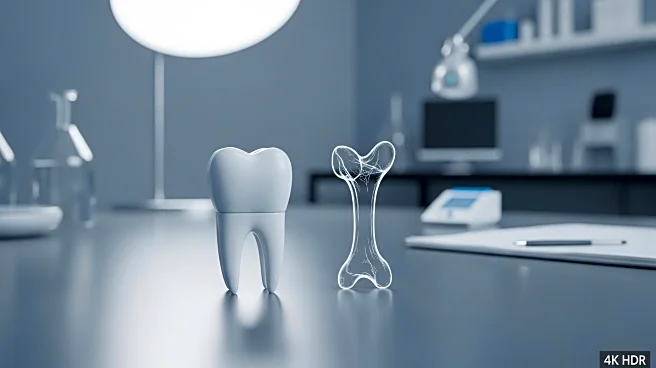What's Happening?
Researchers at Science Tokyo have discovered two distinct stem cell lineages responsible for forming tooth roots and the alveolar bone that anchors teeth in the jaw. This breakthrough was achieved using genetically modified mice and lineage-tracing methods, which allowed the team to uncover specific signaling pathways that direct stem cells to specialize during tooth development. The study, led by Assistant Professor Mizuki Nagata and Dr. Wanida Ono, involved collaboration with researchers from the University of Texas Health Science Center at Houston and the University of Michigan. Their findings, published in Nature Communications, provide a mechanistic framework for tooth root formation and suggest potential for innovative stem-cell-based regenerative therapies for dental pulp, periodontal tissues, and bone.
Why It's Important?
The ability to regenerate lost teeth and surrounding bone structures is a significant goal in dental science, as current solutions like dental implants and dentures cannot fully replicate the natural feel or biological integration of real teeth. This discovery could revolutionize the field of regenerative dentistry by offering more complete restoration options. The identification of specific stem cell populations and their signaling pathways opens new avenues for developing treatments that could restore lost teeth and bone more effectively. This advancement holds promise for improving dental health outcomes and reducing reliance on artificial substitutes.
What's Next?
The findings from this research pave the way for further exploration into stem-cell-based regenerative therapies. Researchers may focus on refining these techniques to develop practical applications for dental treatments. The next steps could involve clinical trials to test the efficacy and safety of these regenerative approaches in humans. Additionally, the study's insights into signaling pathways may lead to broader applications in regenerative medicine, potentially benefiting other areas of tissue engineering and repair.
Beyond the Headlines
This discovery highlights the complex interplay of cellular mechanisms involved in tooth and bone formation, emphasizing the importance of understanding these processes for developing effective regenerative therapies. The ethical implications of stem cell research continue to be a topic of discussion, as advancements in this field raise questions about accessibility, cost, and the potential for unequal distribution of benefits. Long-term, this research could contribute to a shift towards more personalized and biologically integrated dental care solutions.









